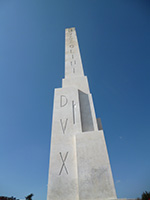Rediscovery of fascist message for the future
A gigantic marble obelisk in Rome has been concealing a hidden message from the days of Mussolini: a Latin text on parchment, which was hidden in 1932 and soon forgotten. Researchers Bettina Reitz-Joosse (University of Groningen) and Han Lamers (HU Berlin/KU Leuven) rediscovered this ‘Codex Fori Mussolini’ and are now making it accessible to the general public.
The researchers think that the ‘Codex’ was primarily intended for future readers. The text gives a history of Italian fascism according to the fascists themselves. It claims that World War I left Italy teetering on the brink. Thanks to divine intervention, Mussolini was able to take over and use his super-human powers to make Italy successful. The text was written on parchment and embellished in a renowned Roman studio.

Cultural significance
The original ‘Codex Fori Mussolini’ is still under the 300-ton obelisk in the Foro Italico complex, on the banks of the Tiber. Publications from the 1930s enabled Lamers and Reitz-Joosse to decipher the message . They have presented the results of their research in a book entitled The Codex Fori Mussolini: A Latin Text of Italian Fascism, which was published in August. In addition to the Latin text of the ‘Codex’, the book also includes the first translation of the document and a detailed study of its content and meaning. In their study, Lamers and Reitz-Joosse examined the cultural significance of this forgotten key text from the era of Italian fascism. The fact that the text is written in Latin makes it particularly unusual. The researchers think that the choice of Latin has a special significance: ‘By writing in Latin, the Italian fascists are alluding to the Roman Empire they wish to restore. At the same time, they saw Latin as an eternal language that would allow them to communicate with people in the future.’ During their research in archives and libraries, Lamers and Reitz-Joosse discovered more unknown Latin texts from the fascist era, including odes to Mussolini and his new order.
The parchment ‘Codex’ is still under the obelisk. It may eventually be removed, but in the meantime the research conducted by Lamers and Reitz-Joosse is helping us to understand the role that Latin played for the Italian fascists, and how they wanted their regime to be documented in the history books of the future.
More information
More news
-
14 February 2026
Tumor gone, but where are the words?
-
19 January 2026
Digitization can leave disadvantaged citizens in the lurch
